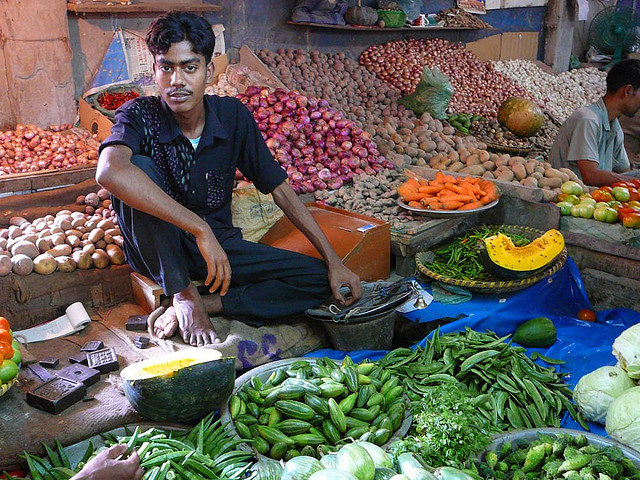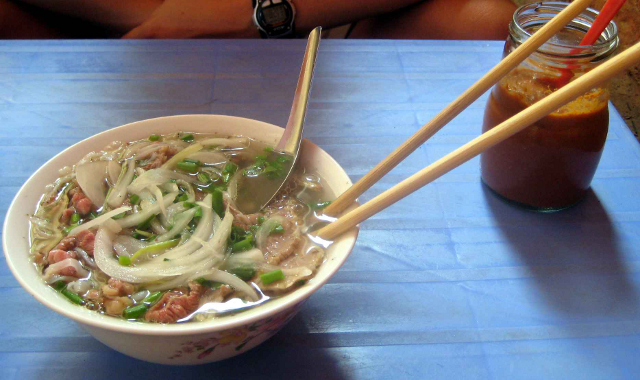RTW travel can do a number on the old immune system. Just by getting on that first plane, you’re opening yourself up to a whole lot of bacteria in a small place, and chances are you’ll be on that first flight for a while. Once you arrive in that first destination, you’ll be eating new food, trying new drinks, and your body will be exposed to things it is not exposed to at home.
No one likes to be sick while traveling. You are far away from home, you won’t have much of a support network with you, finding a doctor can be a pain, and everything is unfamiliar. You will most likely get sick at some point on your trip, whether it’s a cold or virus you picked up or eating something that didn’t agree with your stomach. Luckily there are lots of tactics to employ to make sure health problems remain a minimum on your RTW trip.
Eating well

You’ve heard it once, and you’ll hear it a thousand times when planning and embarking on a RTW trip: A RTW trip is NOT a vacation. You simply can’t treat it as such, particularly when it comes to eating.
When most people go on vacation, it becomes a free-for-all in the food and drink department. A week of letting loose, eating whatever you want without worry, and in some cases, drinking yourself silly. And that’s okay. But if you are traveling for multiple months or even a year, you simply can’t keep up that kind of pace without repercussions.
While you don’t have to be on a diet during your RTW trip, you do want to try to eat as healthy as you can most of the time. When traveling in developing countries, this can be challenging as you’re probably told to avoid many fruits and vegetables.
At the beginning of the trip, it is a good idea to give your body time to adjust to all the new food and handling techniques. If the water is unsafe to drink where you’re at, then simply don’t drink it. Make sure if you are served something with ice in it, that it’s made from filtered water. It’s probably a good idea to stay away from greens that have probably been washed in unclean water. That’s a great way to get some sort of bacterial infection.
When it comes to fruit and other vegetables, the rule is if you can peel it, you can eat it. Bananas are great no matter where you are. Things like apples and pears can be peeled to get the skin off. Oranges are great as well. Having a small knife in your pack can turn out to be an invaluable item for peeling fruits and veggies.
Street and market food

Some of the more conservative travelers tell you to stay away from street and market food as it can be a major culprit in Delhi Belly or Montezuma’s Revenge. But the truth is that you are just as likely to get food poisoning from a fast food restaurant at home.
It would be a damn shame if you had to miss out on eating street and market food. Not only is it going to be your cheapest and most budget friendly option, but often times it’s also going to be the tastiest, most flavorful, and authentic. Going to Vietnam and not slurping pho while sitting down on a tiny plastic chair in an alleyway should be a crime. Heading to India without accepting chai at roadside stands should be outlawed.
Some of the best food in the world is served on the streets; the key is to be careful and smart about your decisions when eating from street stalls. Here are a few tips to help you enjoy your street and market food experience while staying out of the bathroom:
- Only eat at a street cart or market stall if it is crowded. Small crowds mean little turnover. Little turnover means food sitting out in areas where refrigeration methods are questionable at best.
- Watch how the food is being cooked and handled. Mill around a bit and just observe how everything is being done. That’s the beauty of street carts – you can see everything being done right in front of your eyes. If the cook picks his nose then goes back to cooking, you’ll see it. If something doesn’t feel or look right, move along to the next one.
- Look for locals. Locals not only know where the best food is, but they also know where the safest options are. If a cart is buzzing with locals, chances are it’s going to be good and safe.
Other food options
Most RTW travelers eat out a lot more than when they are living at home. When traveling in developing countries in particular, where food is good and cheap, it’s easy to eat out all 3 meals of the day every day without breaking the bank. The problem with that strategy is that it’s difficult to eat healthy all the time if you’re eating at restaurants or food stalls. You never truly know how much oil or butter went into cooking something, so even if you think you’re being good by ordering the veggies instead of fries, there could be a stick of butter on those fresh vegetables.
If you choose to stay in hostels, you can take advantage of the communal kitchens that are in many hostels around the world. It also helps with the budget by going to the market or grocery store and picking up your own goods to cook. You choose what you’re putting in to what you’re cooking, and you can be as healthy as you want.
It also makes sense to make things like sandwiches or bring a box granola bars with you on travel days. It’s even more difficult to eat healthy when on a bus or train all day long. Even if they serve food during your trip, chances are it isn’t very healthy. And if they stop for food somewhere, you never know what you’re going to get. Bringing your own healthy meals and snacks with you can keep you eating well.
Getting sick

It’s quite common to come down with the normal things on the road if you are gone long enough. You’ll be interacting with new people all the time, so winding up with a cold or flu once in a while can’t be much of a surprise. These normal ailments shouldn’t really cause much of a problem in the long run though. If you have a flu you might want to splurge and stay in a hotel for a couple of days, but there are worse things to have to do in life.
If you are careful about heeding the local warnings about drinking tap water and eating fruit that you didn’t peel yourself, you should be able to avoid food poisoning, although this isn’t too uncommon among long-term travelers either. After one or two hellish days you should be fine again, or at least able to resume life as you knew it.
The one you really have to be prepared for is diarrhea. Montezuma’s Revenge, Delhi Belly, or whatever cute name you want to call it, diarrhea is quite common among travelers going through exotic places. It’s not like you’ll get it every week, but you’ll probably eventually get it no matter how careful you’ve been. And being too careful about it can be a bigger drag than actually having it every few months.
Having a cold can be an inconvenience on your trip, but having diarrhea the night before you leave on a 10-hour bus ride can be a killer. Medicines for diarrhea can be obtained in pharmacies around the world, and most large cities have at least one 24-hour pharmacy, but it’s probably worthwhile to start your trip with at least a strip or two of pills just in case (Cipro is an antibiotic and perfect for this, and your doctor at home shouldn’t have a problem prescribing it for you). If you are lucky enough not to need them, you might become someone else’s hero who wasn’t as fortunate.
Prescriptions
If you are currently taking some sort of prescription, you’ll obviously want to bring a supply with you. And of course you’ll want to bring the prescription itself with you for refills on the road. Every city has pharmacies and they are usually easy to find with an illuminated green cross regardless of the language.
Depending on what you are taking, you’ll want to do some research. Drugs tend to be inexpensive outside the States and parts of Europe, and most of the major ones are available everywhere, but many of them go by different names in different places. You should research worldwide availability as well as different global names for any drugs you’ll need on the road.
Read an in depth article about Traveling with Medications from a long-term traveler with a chronic medical condition.
Condoms and birth control
For the fellows, condoms are widely available almost everywhere, and they tend to be reasonably priced in countries where other things are cheap as well. Obviously you want to try to plan ahead whenever possible.
For the women, most recommend bringing whatever birth control you use at home with you, although many things will be available on the road as well. There can be a conflict between malaria medication or other antibiotics and birth control pills so that deserves some research. There is a thread on our message boards that thoroughly discusses this topic in far greater detail than we can do here.
Getting exercise

Depending on what type of city you reside in, you will most likely get a lot more walking exercise while on your RTW trip. Very few travelers rent cars for much of their trips, so relying on your own two feet is the best way to get around.
Even if you walk much more on your trip than you do at home, it’s still a good idea to get some other form of exercise. If you’re in a tropical locale, go for a swim each morning. If you’re a runner at home, bring a pair of running shoes and go for a jog. All cities around the world have gyms, so if you feel the need to pump some iron, look into getting a day pass at a gym. If that doesn’t appeal or is too expensive, you can get quite a workout by doing push-ups and sit-ups in your room or at a nearby park. Resistance bands are small and lightweight and make a good companion for the weight lifters out there.
Check out other opportunities in the town you’re visiting. Many will have classes – things like yoga and tai chi are offered all over the world. Anything extra you can do will have your body feeling good and strong and ready to ward off any infection that comes your way.
Culture shock and travel burnout
A broad part of health on the road is culture shock and travel burnout. Both are things that nearly every long-term traveler has to deal with at some point during his or her trip, no matter how seasoned a traveler that person is.
Culture shock and travel burnout are both large enough topics to tackle on their own, so check out the following articles and resources to learn more:
- Travel Burnout: Is It Real? Will I Get It?
- Experiencing Culture Shock on Your Career Break
- Culture Shock: Overview
- Culture Shock: Language Barriers
For more on staying healthy while traveling, make sure to check out the following guides and articles: